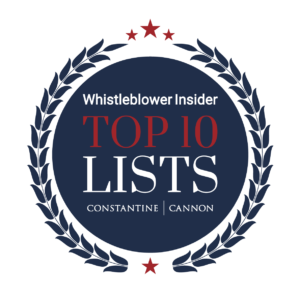Top Ten Federal Financial Fraud Recoveries of 2020

The U.S. government has many enforcement options for financial and investment fraud, including those that provide for whistleblower rewards such as the SEC Whistleblower Program, the CFTC Whistleblower Program, and the IRS Whistleblower Program. These programs, along with a new one under the Anti-Money-Laundering Act of 2020, are open for business and promise to pay millions of dollars in whistleblower awards in exchange for information and assistance in exposing fraud.
Despite programs designed to incentivize whistleblowers to hold fraudsters responsible, financial fraud is as pervasive as ever. Federal enforcement actions run the gamut from cases involving student loan fraud, bank fraud, mortgage fraud, antitrust crimes, and customs fraud.
Several of CC’s Top Ten Federal Financial Frauds of 2020 involve violations of anti-money-laundering laws. With the override of the President’s veto of the National Defense Authorization Act for FY 2021, on January 1, 2021 the Anti-Money-Laundering Act of 2020 (AML Act) became law. Under the AML Act, whistleblowers who provide information that leads to monetary sanctions for violations of the Bank Secrecy Act might receive an award of up to 30% of the sanctions. If the Treasury (through FinCEN) or the Department of Justice recovers more than $1 million in sanctions, an award to qualifying whistleblower might be mandatory. While money-laundering schemes that also violate U.S. tax or securities laws have and may continue to reported under the whistleblower programs of the SEC, CFTC, and IRS, going forward, such schemes might also fall within the whistleblowing provisions of the AML Act.
The following are Constantine Cannon’s Top Ten Federal Financial Fraud Recoveries of 2020. This list is exclusive of cases featured in our other Top Ten posts, which are devoted to specific whistleblower programs and agencies.
-
- Wells Fargo (bank customer fraud, investor fraud) – Wells Fargo & Co. agreed to pay $3 billion to resolve civil and criminal charges that its “cross-selling” practices led to millions of accounts being opened for customers under false pretenses. Between 2002 and 2016, Wells Fargo allegedly pressured its employees to meet unrealistic sales goals, which in turn led the employees to create numerous unauthorized accounts. Wells Fargo admitted that it collected millions of dollars in fees from these improper accounts and products. $500 million of the settlement resolved allegations from the SEC that Wells Fargo misled its investors about the success of its business in part based on touting the success of the “cross-selling” improper accounts and products. These 2020 recoveries are the latest in a long line of enforcement actions against Wells Fargo. The large amount of the various settlements combined with the variety in alleged wrongdoing earned Wells Fargo a place in our Catch of the Week Hall of Shame.
- PEAKS (ITT Technical Institute) (student loan fraud, for-profit school) – PEAKS Trust, the loan servicer for now-defunct for-profit ITT Technical Institute, agreed with the Consumer Financial Protection Bureau and the states to forgive $330 million in student loans. To exaggerate its financial performance, ITT, aided by PEAKS, tricked students into taking out high-cost private loans that had a high probability of eventual default. In this species of education fraud, the bad practices included rushing students through financial aid appointments, aggressive tactics, and gaining unauthorized access to student accounts to sign up for loans. When students couldn’t pay, PEAKS/ITT engaged in collection activities. In addition to loan forgiveness, the settlement requires PEAKS to provide credit reporting agencies information to correct negative credit scores.
- Sandoz Inc. (antitrust violations, generic drugs, patient-allocation) – One of the largest generic-pharmaceutical manufacturers, Sandoz Inc., admitted that $500 million of its product sales were due to illegal agreements with its own competitors. Sandoz Inc., other generics companies, and executives, colluded to allocate customers, rig bids, and raise prices for various generic drugs. Anticompetitive activity, such as bribery and bid-rigging, can lead to various liability including under False Claims Act. Here, Sandoz Inc.’s violation of antitrust laws caused customers to pay unnecessarily high costs for critical medications. For this shameful conduct, Sandoz agreed to pay a $195 million in criminal penalties.
- Ambiance Apparel (customs fraud, money laundering, tax evasion)–LA-based clothing importer Ambiance Apparel and its owner Sang Bum “Ed” Noh conspired with foreign clothing manufacturers to understate falsely the value of imports. The manufacturers created two invoices: a fake one for U.S. Customs and Border Patrol, which would be paid by letter of credit and upon which tariffs were calculated, and a real (higher) one for the customers, paid by wire transfer. Over a period of five years, Ambiance undervalued the imports by a whopping $82.6 million and avoided $17.1 million in tariffs. Customs fraud like this can be exposed by whistleblowers under the False Claims Act. For its efforts, Ambiance Apparel and its owner pleaded guilty to federal crimes including conspiracy, money laundering, and related false tax returns, and agreed to pay a total of $118 million. Talk about high-end fashion!
- Florida Cancer Specialists & Research Institute LLC (antitrust, cancer-patient allocation) — A leading cancer-treatment center, FCS, admitted to antitrust crimes resulting from its illegal agreement with another provider not to compete in chemotherapy and radiation treatments to cancer patients in multiple counties in southwest Florida. This conspiracy allowed the oncology group to operate with minimal competition, thereby limiting important choices for cancer patients. The group agreed to pay $100 million in criminal penalties and cooperate with ongoing federal antitrust investigations into market allocation and other anticompetitive conduct in the oncology industry. In some cases, whistleblowers can expose market allocation and other anti-competitive activity using the False Claims Act.
- Nationstar Mortgage (dba Mr. Cooper) (distressed mortgage fraud) — The largest non-bank mortgage servicer in the country, Nationstar (Mr. Cooper), agreed to pay $79.2 million in restitution to tens of thousands of borrowers and $7.1 million to government parties. Nationstar particularly harmed homeowners in distress by disregarding or ignoring loss-mitigation applications, plans, and agreements, and by foreclosing on borrowers despite promises not to. The servicer also allegedly improperly increased borrowers’ payments, failed appropriate to handle private insurance policies, and even failed to timely disburse tax payments from escrow accounts. These heartless practices violated laws, including the Consumer Financial Protection Act of 2010, Real Estate Settlement Procedures Act (RESPA), and Homeowner’s Protection Action of 1998 (HPA). This conduct follows the housing and mortgage fraud that contributed directly to the 2008 financial crisis.
- Industrial Bank of Korea (money laundering, Iran sanctions) – The Industrial Bank of Korea agreed to pay $86 million for processing more than $1 billion of transactions between Korean and Iranian entities, in violation of economic sanctions law under the International Emergency Economic Powers Act. The bank’s alleged violations of the Bank Secrecy Act stemmed from its failure to establish and conduct an effective anti-money laundering program, despite repeated warnings by its New-York based compliance officer.
- First Data Merchant Services, LLC (laundering payments for consumer scams) – First Data, a payment processing company, agreed to pay $40.2 million to resolve FTC charges that it laundered, or assisted laundering of, credit card transactions for scams facilitated by Chi “Vincent” Ko and his company First Pay Solutions LLC. Ko opened hundreds of merchant accounts to process payments for scams that targeted hundreds of thousands of consumers, and First Data knowingly processed payments for those scams.
- Bank Hapoalim (money laundering, illegal bribes of soccer officials) – Entities of Bank Hapoalim, an Israeli banking conglomerate, pleaded guilty and entered into civil settlements for their role in a money-laundering scheme related to bribes made to soccer officials with Fédération Internationale de Football Association (FIFA) and others. The bribes were in exchange for preferences including in the award of soccer match broadcasting rights. As part of three-year non-prosecution agreement, the bank will pay $30,060,000. The bank simultaneously entered into a separate settlement regarding tax evasion.
- Interactive Brokers LLC (money laundering, failure to file SARs) – Brokerage firm Interactive Brokers agreed to pay $23.7 million to the SEC and CFTC, as well as a $15 million penalty to the Financial Industry Regulatory Authority (FINRA), to resolve allegations related to the firm’s anti-money laundering policies. Over the course of one year, the brokerage failed to file more than 150 Suspicious Activity Reports (SARs) for U.S. microcap securities trades it executed on behalf of its customers. The firm also failed to recognize red flags concerning transactions and failed properly to investigate suspicious activity, including in its handling of the accounts of Haena Park.
2020’s Top Ten Financial Frauds represent some of the most egregious cases of financial fraud affecting taxpayers, consumers, the government, and the U.S. economy. For information about top recoveries in government enforcement actions involving specific agencies and programs, see our other Top Ten Lists.

Annual Whistleblower Insider Top Ten Lists
Every January, Whistleblower Insider looks back at the significant government enforcement actions of the past year. Our Top Ten lists highlight the biggest recoveries and significant enforcement efforts by different government actors in cases of interest to whistleblowers.
Browse Top 10 Lists
Read More:
- Our Top Ten Lists
- Financial and Investment Fraud
- Anti-Money-Laundering
- Student loan fraud
- Housing and Mortgage fraud
- Bribery and Bid-Rigging
- Customs Fraud
- International Whistleblowers
- Constantine Cannon’s Whistleblower Team
- Whistleblower FAQs
- I Think I Have a Whistleblower Case
- Submit a Confidential Whistleblower Claim
Tagged in: Bribery and Bid-Rigging, Customs Fraud, Education Fraud, Financial and Investment Fraud, Financial Institution Fraud, FIRREA, Government Loan Programs, Housing and Mortgage Fraud, Top 10,